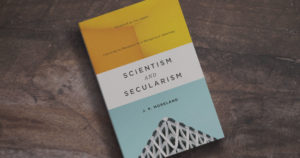The Ironies of Strong and Weak Scientism
September 27, 2018
 One of the great ironies of all of this is that scientism is not a doctrine of science; rather, it is a doctrine of philosophy. More specifically, scientism is actually a doctrine of epistemology (the branch of philosophy that studies what knowledge is and how we obtain it). Here is another irony: scientism distorts science. By its very nature, science cannot claim to be the only way to know reality.
One of the great ironies of all of this is that scientism is not a doctrine of science; rather, it is a doctrine of philosophy. More specifically, scientism is actually a doctrine of epistemology (the branch of philosophy that studies what knowledge is and how we obtain it). Here is another irony: scientism distorts science. By its very nature, science cannot claim to be the only way to know reality.
Roughly, scientism is the view that the hard sciences—like chemistry, biology, physics, astronomy—provide the only genuine knowledge of reality. At the very least, this scientific knowledge is vastly superior to what we can know from any other discipline. Ethics and religion may be acceptable, but only if they are understood to be inherently subjective and regarded as private matters of opinion. According to scientism, the claim that ethical and religious conclusions can be just as factual as science, and therefore ought to be affirmed like scientific truths, may be a sign of bigotry and intolerance.
Exclusive offer for JPMoreland.com readers! 40% discount on print/ebook of Scientism and Secularism by going to crossway.org/more40 [now expires 10/31/18!]
In scientism, therefore, science is the very paradigm of truth and rationality. Strong scientism implies that something is true, rationally justified, or known if and only if it is a scientific claim that has been success fully tested and that is being used according to appropriate scientific methodology. There are no truths that can be known apart from appropriately certified scientific claims, especially those in the hard or natural sciences.
Weak scientism is still scientism, but it allows for more “wiggle room.” Weak scientism acknowledges truths apart from science, granting them some minimal rational status even if they don’t have scientific support. Nevertheless, weak scientism still implies that science is by far the most authoritative sector of human knowing.
For practical purposes, weak scientism amounts to pretty much the same thing as strong scientism, though, technically speaking, they do differ. As noted above, weak scientism does not say that the sciences—especially the hard sciences—are the only way available to us to achieve knowledge of truth about reality; rather, advocates of weak scientism are willing to grant minimal rational status to at least some disciplines that most would not classify as scientific fields. If some field lacks scientific status or backing, then it is of negligible intellectual value and, if at all possible, the hard sciences (e.g., neuroscience) must take over nonscientific areas (e.g., spiritual teachings—note the number of books claiming that new insights from neuroscience have put spiritual growth on a new plane of authority) or must exert its influence in the more human sciences (psychology, education, etc.) in order to increase the credibility of those fields and to provide us with solid knowledge in them.
Download a free excerpt of the Scientism and Secularism! Help support content and leadership that advances the Christian worldview by becoming a regular financial supporter of Eidos Christian Center today!


Professor Moreland, I agree with you that ‘scientism’ is clearly a nonsensical view and easily shown as such. However, you seem to regard it as a very serious problem judging from the amount of time you spend arguing against it. Given this, would it be possible for you to provide some examples of ‘scientism in action’, for want of a better term, to show what sort of problem it is and what effect it has on society?